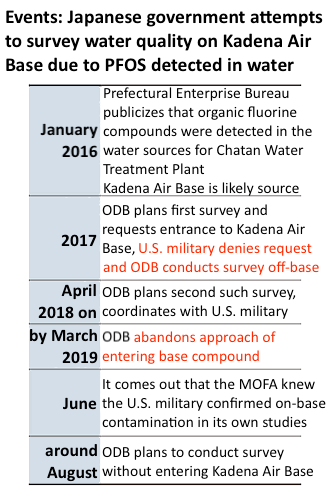Japanese government abandons plan to survey PFOS contamination on Kadena Air Base after being denied entrance over two consecutive years

July 11, 2019 Ryukyu Shimpo
By Manato Akira
The Okinawa Defense Bureau (ODB) made requests to enter Kadena Air Base to conduct surveys in 2017 and 2018 after high concentrations of contaminants such as the organic fluorine compound PFOS were detected in rivers and springs around U.S. military bases. However, the Ryukyu Shimpo discovered on July 10 that the ODB has abandoned this approach, as the U.S. military has not granted it permission to enter the base.
Due to this, the ODB has decided to conduct surveys outside the base compound, requiring coordination with the U.S. military, which will take about one year.
These surveys have been delayed into 2019 and have not yet been conducted. The Okinawa Prefectural Government (OPG) and others have requested that the U.S. military allow these surveys, but it has become clear that the national government also cannot gain access to the bases.
Information about the ODB’s approach to these surveys became public through a right-to-know request from Director Masami Kawamura of the Informed Public Project.
Director Kawamura pointed out, “The Japanese government has not been able to do anything about this issue.
Yet it is uncertain whether the Japanese government can conduct surveys regarding the source of contamination on Okinawa’s behalf if the military bases of an ally, the United States, could be identified as the source of the contamination.”
According to the disclosed data, the initial plan for the surveys and analysis called for coordination with the U.S. military to take place between April and August 2018, for procedures to be ordered by September or October, and for surveys around the Hija River to commence in November 2018.
Even though coordination with the U.S. military was completed by May 2019, those conducting the surveys are not permitted to enter the base, and will conduct their studies outside the base compound, instead. The surveys are set to commence around August this year.
In an interview with the Ryukyu Shimpo, an ODB spokesperson said, “With no standards regulating contaminants like PFOS domestically, there are no means to make practical use of these results in coordination with the U.S. [military].
” Procedures for entering U.S. bases and coordination of environmental studies set forth by the U.S.-Japan Status of Forces Agreement do not address conditions for entering base compounds or environmental regulation levels.
An ODB spokesperson said that current efforts to coordinate with the U.S. military are not based on any specific agreement.
In 2017, too, the ODB planned surveys on and off of the base compound, but the U.S. military did not comply, and the ODB shifted its study sites off-base.
[Word from the Wise] Director Masami Kawamura of the Informed Public Project suggests that the OPG accumulate, sort, and disseminate documented facts concerning contamination
It is not clear how and to what extent the Japanese government has put pressure on the United States in negotiations, or what significance the planned surveys might have in terms of guaranteeing safe drinking water. Now that the ODB has abandoned the idea of entering the base compound in favor of aimlessly surveying the base’s surroundings, the OPG and Okinawans cannot just sit by and watch.
We must not allow the Japanese government to use the excuse that because it cannot enter the base compound, it cannot move forward with addressing the issue.
I do not think Okinawans will accept this reason, either. Regrettably, now the matter of entering the base compound at all has become its own goal, with the administration requesting entrance and the Kadena Town Assembly adopting a written statement to this effect, without consideration to the reasons for entering the base compound.
It is essential that we exercise awareness and do not take steps like that prematurely.
U.S. military representatives do not seem to be making efforts to deny Kadena Air Base as the source of the contaminants, whether in U.S. Forces, Japan reports concerning the issue, or in negotiations between the Air Force at Kadena Air Base, the OPG and the Japanese government.
There is also data from on-base studies by the U.S. military including surveys of the rivers and groundwater in the vicinity of military bases in Okinawa, and from water wells on the base compound.
First, the OPG should accumulate and organize data such as this, including facts regarding communications with the U.S. military, and then accurately publicize the current status of this issue.
Even with the restrictions under which people are not allowed entrance to the base compound, Okinawans and the administration must keep considering specifically where and how to leverage pressure, and what actions are possible.
(English translation by T&CT and Erin Jones)
Previous Article:Okinawa’s tourism revenue for 2018 at record high of 733.4-billion yen
Next Article:Governor Tamaki holds a press conference discussing new Henoko lawsuit, hoping for “A ruling that will shine a light on the concept of regional autonomy”
[Similar Articles]
- Japanese government knew of Kadena Air Base’s PFOS contamination, did not disclose it
- Editorial: U.S. military denies entry to base preventing essential right conduct surveys
- Record high concentrations of PFAS detected in groundwater around Kadena Air Base
- OPG finds high PFOS concentrations near Kadena Air Base, advises against drinking the water
- Okinawa Vice Governor protests “bad weather” pretext for relocating parachute drop training
 Webcam(Kokusai Street)
Webcam(Kokusai Street)


